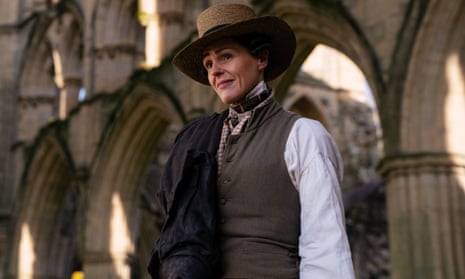Halifax, 1834. Four weeks after a secret wedding in a York church, where two women took communion and exchanged rings, witnessed by no one but their proud, brave, corseted selves. And 180 years before the first lawful same-sex marriages will take place in the UK. Just think of it. Actually, there’s no time, because here she is, the trailblazer herself, billowing coat-tails lustrous as a raven’s plumage, top hat silhouetted against the rolling hills of West Yorkshire. Striding – for Anne Lister, as all those who fail to keep up with her know, has no other walking mode – to tell her secret wife’s vile aunt what’s what. “Ah, there you are,” she says, turning to the camera and jabbing the air with her silver-topped cane. “Good.” Happy Sunday primetime period drama slot, folks! Gentleman Jack is back.
For paramours of Sally Wainwright’s rollicking, romantic and exquisitely scripted historical drama, it’s been a long three-year wait. The first series was so brilliant it spawned the “Gentleman Jack effect”: a festival in Halifax, a statue (of a swaggering 19th-century Yorkshire lesbian!) and legions of global superfans. Not just of the show but of the garrulous diarist, industrialist and landowner herself, Anne Lister of Shibden Hall, who scribbled more than 5m words in her pioneering lifetime. All of which Wainwright seems to have gobbled up, infused with 21st-century irony and northern grit, and turned into one of the greatest British period dramas of our time.
Much of this is down to Suranne Jones, whose Lister is an alchemical force of nature. Intense, uncompromising, reckless, charismatic, controlling, fragile and highly charged, Jones endlessly flirts with, but never tips over into, hamminess. It’s a genius performance, brimming with grand gestures and heart. So, too, are her direct addresses to the camera. It’s true that Jones’s Lister doesn’t so much break the fourth wall as make love to it, before buying it a silver wax seal and asking it to move in with her. But when she looks into the lens she is also collapsing time. Addressing us, the future inhabitants of a 21st century where she might be understood, valued, seen.
If anything, she is even bolder this series. With her beloved Ann Walker stationed in York against the wishes of her small-minded, money-grubbing family, Lister has her work cut out. She has to convince all of Halifax that the solution to Ann’s fragile mental state is to move in with her. She has to convince Ann that they must combine estates, leading to perhaps the only sex scene in history in which the rewriting of wills is used as pillow talk. She has to convince the men sinking her coal pit that she has the capital, and her solicitor that she needs to borrow more money to realise her daring plans. Oh, and Lister has to convince herself that she is over Mariana, her ex, and that her love, or is that fondness, for Ann is enough. “We none of us feel the same way at 40 as we did at 14,” she confides to a friend. “With her I could be happy. I’ll make it work!”
Edward Hall, Amanda Brotchie and Fergus O’Brien direct this series, bringing less of the galloping pace and northern specificity of Wainwright, who grew up a few miles from Shibden Hall. Instead, we get classic Andrew Davies-grade romance. In one lush scene, Ann is sketching the magisterial ruins of Rievaulx Abbey when Lister comes striding over the moor as the sun burns off the morning mist. It’s pure Darcy emerging wet-shirted from the lake stuff, but with a lesbian romantic heroine, jacket tossed over one shoulder and straw boater atop her tousled hair. How revolutionary. “Three very good kisses last night,” Lister says with a sigh as she heads down to her wife. “I am really satisfied with her.”
This is a vexed moment in British period drama and history. The conversation continues about what constitutes good representation. About the ways in which greater diversity might be compounding amnesia and not challenging our long-upheld fantasies about some non-racist, benignly colonial British past in which no one was queer. Meanwhile, here’s Wainwright rolling up her sleeves and getting on with it. Behind the familiar frilly bonnets and linen drawers, the glorious landscapes and draughty old estates, Gentleman Jack is disrupting the conventions of one of our most fiercely loved dramatic forms, at a time when we most need them disrupted. It is a masterpiece. A gleeful, radical shake-up of period drama that repositions history, sexuality and class with the wink of an eye and poke of a cane. As a bisexual brown-skinned British woman who has been watching Sunday-night period dramas all my life, I cannot tell you how thrilling it is to see.
Gentleman Jack season two is on BBC One in the UK; in the US, on HBO from 25 April; and in Australia, on Foxtel from 26 April.
